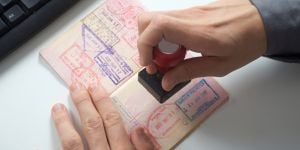Exemption: when do I not have to take the civic integration examination?
In any of the following cases, you do not have to take the exam:
You are younger than 18 years of age.
You have reached the legal AOW pension age. The AOW pension age differs for persons.
You have lived in the Netherlands for at least 8 years during the compulsory school age.
You have the Belgian or Luxembourg nationality.
You have the Turkish nationality or you are a family member of a Turkish national. Family members are:
The married/registered partner;
The children and (great) grandchildren of the Turkish foreign national and his married/registered partner, who are younger than 21 or who depend on him.
The parents and (great) grandparents of the Turkish foreign national and his married/registered partner, who depend on him.
You have one of the following diplomas or certificates:
A civic integration certificate under the Civic Integration Act.
A Dutch degree or diploma of, for example university, higher vocational education, general secondary education, or secondary vocational education level 2 and higher. You were taught in Dutch.
A diploma or certificate obtained in Belgium or Suriname. You were taught in Dutch and you passed the subject of Dutch. You have a high school diploma or a diploma equal to a Dutch diploma mbo level 2 or higher, hbo or university.
A diploma, certificate or other document from Aruba, Bonaire, Curaçao, Saba, Sint Maarten or Sint Eustatius, obtained in Dutch-language education. You passed the subject of Dutch language. It involves the following diplomas: mavo, havo, vwo, lbo, mbo, hbo en university.
A diploma from the European school of the European Baccalaureate (as provided in the Statute of the European School). You have attended and passed the subject of Dutch as a first or second language.
An International Baccalaureate Middle Years Certificate, an International General Certificate of Secondary Education or an International Baccalaureate. You have had English-Dutch classes. Or you have attended and passed the subject of Dutch.
A Naturalisation Test Certificate of before 1 April 2007. You have passed the following 5 tests: kennis van staatsinrichting en maatschappij, speaking, listening, writing and reading.
A Civic Integration Certificate within the context of the Civic Integration (Newcomers) Act. You have completed the WIN programme by 31 December 2006. This has to be included by a statement of the ROC. The statement shows that you passed a profile test for the 'listening' and 'speaking' parts at level NT2-2, for the 'reading' and 'writing' parts at level NT2-1 and for the Social Orientation part 80% if this test was done after 31 August 2001 or 85% if the test was done before 1 September 2001.
A certified copy of a Civic Integration Certificate within the context of the Civic Integration (Newcomers) Act if you completed the WIN programme in 2007 or 2008. This has to be included by a statement of the ROC. The statement shows that you at least passed the 'listening', 'speaking', 'reading' and 'writing' parts at level NT2-2** and for the Social Orientation part 80% if this test was done after 31 August 2001 or 85% if the test was done before 1 September 2001.
A certified copy of a Civic Integration Certificate for settled immigrants with level NT2-2 for the parts 'Listening', 'Speaking', 'Reading' and 'Writing'.
A copy the document issued after you passed the 'Short Exemption Test' (obtained before 1 January 2013). This must show that you have reached level B1 of the European Framework for Modern Foreign Languages.
A certified copy of the exemption decision (official letter) from the municipal executive based on:
Article 5, 2nd paragraph of the Civic Integration (Newcomers) Act, stating that no civic integration programme has been followed, due to the fact that your Dutch is already good enough.
article 5, 4th paragraph of the Civic Integration (Newcomers) Act, stating that no civic integration programme is followed, because you passed a test as referred to in this article.
A copy of the document used to demonstrate that you do/did not have to sit the naturalisation test based on Article 4 of the Naturalisation Test Decree.
A copy of a letter from the municipal executive stating that because of demonstrable efforts on your part, the municipal executive comes to the conclusions that it is not reasonably possible for you to pass the civic integration examination. You can use this document if you became obliged to participate in a civic integration programme before 1 January 2013.
A copy of a letter from the Education Executive Agency (Dienst Uitvoering Onderwijs or DUO) stating that because of demonstrable efforts on your part, DUO comes to the conclusion that it is not reasonably possible for you to pass the civic integration examination. You can use this document if you became obliged to participate in a civic integration programme after 31 December 2012.
a copy of a letter from the Education Executive Agency (Dienst Uitvoering Onderwijs or DUO) stating that because of demonstrable efforts on your part, DUO comes to the conclusion that it is not reasonably possible for you to pass parts of the civic integration examination, as referred to in Article 7(2b and 2c) of the Civic Integration Act. And a copy of a letter from the Education Executive Agency (Dienst Uitvoering Onderwijs or DUO) stating that the participation statement referred to in Article 7(2a) of the Civic Integration Act (WIN) is completed. You can submit these documents if you became obliged to participate in a civic integration programme in the period after 30 September 2017.
Are you not eligible for an exemption on the basis of one of the before mentioned exemption grounds? Please contact the Dienst Uitvoering Onderwijs (DUO) for obtaining the civic integration diploma.











